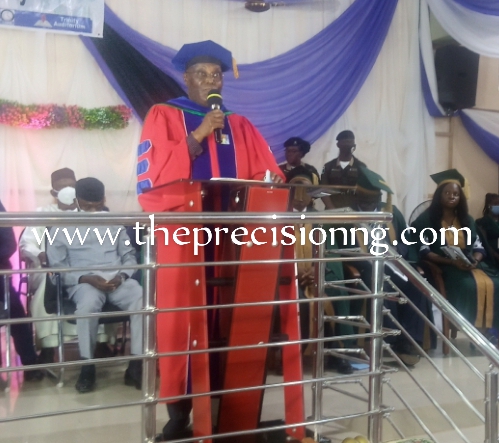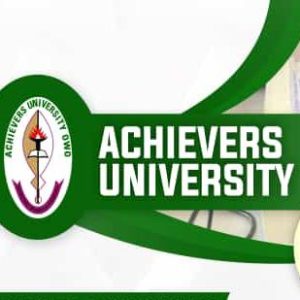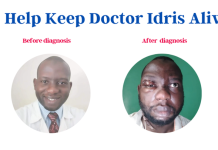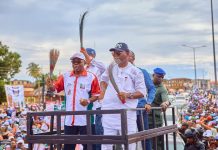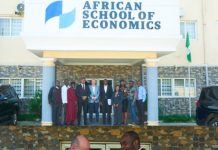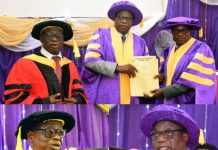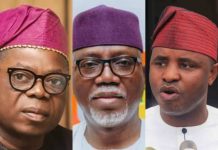
Diversity, Education and Autonomy: Developing Nigeria in the Years Ahead Being Convocation Lecture delivered by Atiku Abubakar, GCON, former Vice President, Federal Republic of Nigeria, at Achievers University, Owo, Ondo State, Nigeria.
10 December 2021.
Protocol
I want to talk to you about three interrelated things: Diversity, Education, and Autonomy and their connection to Nigeria’s development in the coming years.
Permit me to start with a personal story. When I was a little boy my father, who was very poor, refused to send me to school. He did not hate or dislike education of any type. And it was not about school fees; in fact, we were even paid to go to school in those days. He just needed me to herd cattle. That was normal in those days, and, is still so for many families, even today. For refusing to send me to school, he was sent to jail by the local authorities. Eventually I did go to school. Unfortunately, my father did not live long enough to see where education would take me. He drowned while trying to cross a local river. He was probably under 40 years of age by the time he died. I was an only child and was raised by my maternal grandparents. As a primary school pupil when I returned from school, I would take our neighbour’s cattle to the bush for rearing in exchange for grains that my grandparents used to help feed the family. So, I was contributing, at that very early age, to the family’s economic wellbeing.
During those early years in school, I had the privilege of being thought by some young American Peace Corps volunteers who approached teaching differently from what we were used to. It struck me that the Americans were more liberal in their approach and encouraged us pupils to think critically about solving problems rather than making us memorize and spit out the same things that were drilled into us. They also encouraged us to question or challenge their ideas and to be critical of them if necessary. That approach intrigued me and lit a fire in me that still burns to this day.
I eventually left my local Adamawa community and furthered my education in Kano and Zaria. At the School of Hygiene, Kano, I was the Student Union President. So apart from meeting those wonderful Americans, education also took me beyond my locality and began to expose me to the vastness of my region, Northern Nigeria, and its immense diversity. Education is what helped me to secure a job in the Nigerian public service, a job that took me to many other parts of Nigeria, including its southern edges. I got to see the vastness and variety of our land, the diversity of its peoples, cultures and levels of development. And in all these travels and movements I got to understand the country, and made so many life-long friends.
These were indeed life-changing experiences. Put simply, we are a very diverse people. But, as anyone who has mingled with other peoples will tell you, diversity does not prevent us from making long-lasting friends across the divides. Diversity is not something to be afraid of. Diversity does not prevent a country from reaching its potentials. Rather it should make a country reach its potentials faster, but only if that diversity is harnessed properly, if the diverse peoples and places are pulled together for a common purpose, drawing on the strengths of each. In the wrong hands, especially in the hands of opportunistic politicians and demagogues, diversity can become a problem, a tool of division, violence, and destruction.
I realized quite early that education gave me so much and that, if made available to many more young people, will also give them so much and help the country progress just like other countries that take education seriously. Education enlightens us and opens our eyes to better understand our environment and the world around us; it helps us increase our incomes; it helps us maintain good personal hygiene; it helps us to understand our bodies better and to take steps to improve our overall health; it helps us to understand the challenges facing our communities, our country and the world, and how we can apply ourselves to solving even a tiny part of those challenges. Thus, education helps to provide us with the tools to change the world.
What about autonomy? Education and the success it brought to me helped to make me become a freer person, a more autonomous person. The more educated you are the more control you tend to have over your life; the more freedom you have to choose what you want to become or what you want to do, where you want to live and with whom you want to associate. Put simply, the more educated you are, the more freedom you tend to have. Therefore, the educated person is a more autonomous person. So, in a way, you can say that education is freedom. Education is autonomy. Autonomy is critical for the individual or group to reach their full potentials. If a person or a group is held down by others, they cannot achieve their full potentials. When you are free you are more adventurous; when you are autonomous you are more creative. When you are freer you take more decisions based on what you desire.
As it is with the individual so it is with nations. Education is a social good. Countries that value education and make the necessary investments in it also tend to have more control over their affairs. The nations that treat education and innovation more seriously and invest massively in them are also the leading nations of the world. And in the 21st century education and innovation are key to national prosperity.
And there is more. Educating girls and women is even more impactful. Research spanning over three decades shows that for a society to make progress it is even more important to educate women and girls because of the positive impact it has on the development of children and their health and those of the family.
These the reasons why my philanthropy has focused the most on education. After so many years of giving scholarships to students from less well-to-do families and helping friends and communities build schools across the country, I began to build a school system in my hometown, Yola, that today incorporates all levels, from kindergarten to university. Let me tell you a little bit about my town and my state. Adamawa is it at the North East edge of Nigeria, clearly isolated from the power and commercial centres such as Abuja, Kano, Lagos and Port Harcourt. Although it has produced a good number of successful and prominent Nigerians, it is rather poor. The vast majority of the people are subsistence farmers struggling to eke out a living while battling draught and climate change and, more recently, the Boko Haram insurgency in the parts of the State bordering Borno State. The insurgency has displaced many people from their homes and farms thereby threatening their very livelihood. In fact, the UN World Food Programme estimates that the number of internally displaced persons in the North East surpassed 2 million by last September.
The existence of the university proved so timely and because Yola was (and remains) safe, the university assisted immensely in feeding nearly 3000 IDPs during the height of the Boko Haram insurgency. And it has been helping the rescued Chibok girls complete their education. In fact, 57 of those girls registered for undergraduate studies at American University of Nigeria this Semester. University education will prepare them and other students, just like the fresh graduates sitting here today for a life of more meaningful contributions to society and of course, more personal fulfilment.
So why does it seem like the importance of education for a society such as ours is so difficult for some to understand? Why do we seem reluctant to the idea of providing good quality basic education for all our people? Why can’t we see that the neglect of education for our people has huge long-term consequences which have become obvious already as our country is engulfed in security challenges across its length and breadth?
We persuade parents to vaccinate their children against infectious diseases because vaccination is a good thing. Why don’t we do the same for education? Parents should be persuaded, even forced, to send their children to school so they, at least, acquire basic education. That basic education should be free and compulsory. I believe that if there are severe consequences for parents who refuse to send their children to have free primary and secondary education, we would not have over 13 million out-of-school children in Nigeria. Certainly not. Our per capita income would not have stagnated for 40 years. Think about it, our per capita income is today what it was forty years ago.
Beyond basic education we should have a variety of options for post-secondary education – university, polytechnic, colleges of education, vocational training for those who would rather acquire vocational and technical skills for particular trades.
As we prioritize education, let us also make full use of our diversity for the development of our country. In addition to ethnic, religious, and regional diversity, we also have diverse endowments – agriculture, crude oil, solid minerals, tropical rain forests, Savanah grasslands; lakes, rivers and streams that dot and snake around the country. As different parts of the country are at different levels of development, local priorities would differ. Earning capacities differ. Therefore, we need to tailor our development policies and practices to acknowledge this diversity and benefit from it. The constituent parts of the country need a greater degree of autonomy to develop their local economies according to their endowments and priorities.
The excessive centralization of power and concentration of resources in the federal government have not served us well. Instead, they have encouraged a domineering all-knowing federal government that stretches itself into every aspect of our lives with little positive results to show. Rather we have had excessive corruption, mediocrity, generations of citizens who hope to become rich without work, emasculation of state and local initiatives and a lack of creative and healthy competition among states as they all look towards Abuja for handouts every month. The development strategies that have produced 13 million out-of-school children, millions of unemployed or under-employed youth, including those with university degrees, and a level of insecurity that threatens to splinter the country into tiny bits controlled by armed warlords are clearly the wrong ones. We must change direction.
We must reverse the concentration of power and resources at the centre. And we must make serious and conscious efforts to identify the potentials and strengths of each state and section of this country and work to maximize its contribution to the development of our country as it is supported to develop itself. That is how you allow greater autonomy while pulling together. Greater autonomy for states will allow ideas to germinate from anywhere and blossom. If Kano becomes a thriving industrial city, Jigawa would benefit and soon become an industrial centre as well. If we support the emerging automobile centres in Nnewi, Kaduna, Bauchi and Lagos, the tanneries of Kano would be the natural local suppliers of leather to that sector. If we reverse the on-going de-industrialization and attract tire manufacturing companies back to supply that sector, jobs will be created and the rubber plantations in Edo and surrounding states will benefit. I can go on and on, but you get the picture. If we have good transport and communication infrastructure and a reasonably free market, no section of a country would develop without the others soon joining in. Capital moves and expands to take advantage of new opportunity centres.
Reduction of federal powers and responsibilities and greater autonomy for states would, for instance, allow a state with very low demand for university spots to decide whether its priority is another federal university or investments in primary, secondary teacher education to ensure that its young population has basic education, preparatory for possible university or vocational education in the future.
I commend Achievers University and its determined and focused Founder, Bode Ayorinde.
When I lived and worked in this part of the country, I realized that the Ondo was the centre of education in the South West. Thankfully, this university will help to maintain that reputation while also benefitting people from other parts of the country. Thank you Bode for keeping the Ondo spirit and character alive. And thank you for providing this important educational alternative for these young men and women whose lives have certainly been transformed.
To the graduating students, it is your day, your convocation, your chance to go forth and show the world what you can do. To show what you can become. To show that you can lead. To show what problems you can help the world to solve.
Let your imagination run wild. Imagine where you would be in 10 or 20 years from now. Imagine where Nigeria would be. Would you be satisfied with it? If so, what role would you have played in getting it there? If not, what role would you play in helping to get it to where you would be satisfied with its progress? What would be Nigeria’s population then? How educated would that population be? What would be the place of crude oil in the world’s energy mix by then? What would that mean for Nigeria? Is there a role that you can play in positioning Nigeria for that trajectory? Or would you just be fighting the wars we fight today over the sharing of oil revenues? Would you rather be one of those who move Nigeria beyond oil and other fossil fuels not only to help the country’s economy thrive in a new post-oil world but to also reduce global warming and protect our eco-system? Would you be the one who solves Nigeria’s perennial challenge of providing electricity? Could you be the one who transforms the Made-in-Aba brands into global icons? Would you be content with debating about which region or zone should produce the next President or governor or rather organize and work to ensure that the country has governance and accountability structures, rules and processes which would ensure that where the president or governor comes from becomes less important?
Remember that Tesla and Amazon, which have made Elon Musk and Jeff Bezos the two richest men on the planet were only founded in 2003 and 1994 respectively. They became what they are today because they solved problems for the world. Think of the problem you can solve for your community, your country and the world and, hey, you might become our own version of Elon Musk or Jeff Bezos. Once more congratulations. You made it. Now go and make more.
I thank you all for listening.


